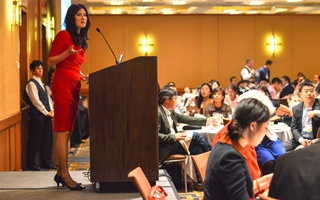In weighing the pros and cons of a summit conference, the United States must accept the fact that it will realize no success without making considerable sacrifices. As the chances for success grow dimmer, the requisite sacrifices grow greater. If the drift continues, the decision will make itself, and once again this country will have failed to articulate a conscious choice between conflicting alternatives.
The basis of the Government's anxiousness for top-level negotiation is a vague faith in the Kremlin's desire to reduce world tension and halt the armaments race. But this faith appears to be grounded more in hope than in certitude. The Soviet Union's past and recent actions and pronouncements offer little evidence of her good intentions.
The U.S. has also continued the agonizing effort to establish negotiations with Russia in order to placate the Western allies, who until recently have been obstinately optimistic over the value of summit talks. In an effort to satisfy this optimism and to alleviate the sources of dissension in NATO, the United States has bent over backwards to reach some sort of preliminary accord with Moscow.
Under the right conditions, some good could undoubtedly emerge from a summit meeting. An agreement on disarmament, on space control, and on the Middle East would go far towards reducing the danger of open conflict and healing many sore spots of American foreign and domestic policy. But until an atmosphere and fundamental agreement conducive to further negotiation appears, no amount of discussion, however earnest and diplomatic, will result in any significant solution.
At the present time, the odds are heavily weighted against a summit meeting resulting in any success at all for the United States. Such a conference could be a propaganda disaster for this country, and it seems safe to assume that the Kremlin will engage in no discussion that would not result in a Soviet propaganda victory of some sort. But more important, a summit meeting could easily force the U.S. into a position in which she would have to gloss over a defeat, or sacrifice too heavily for a victory.
Mr. Khrushchev seeks a summit conference primarily for the vague generalizations of illusory accord which would come out of it, euphemistic statements corroborating the U.S.S.R.'s peaceful intent. It is possible, and even probable, that the U.S. would agree to the issuance of public statements of this nature, if only to satisfy the "solutionist" optimism of the American people. As at Yalta, it might seem necessary for the Government to reach agreement for agreement's sake, to underscore the positive value of negotiation, even at the expense of future American policy. At Geneva in 1956 what at first appeared to be hopeful accord resulted ultimately in reduced alternatives for U.S. policy. A summit meeting at the present time might easily repeat that situation.
Negotiation as an instrument of foreign policy is no longer the valuable accommodating technique it used to be. As Dean Acheson said last week in Durham, N.H., "... in the last twelve years, the international conference has ceased to be an instrument for ending conflict, and has become one for continuing it." The perils of an illusory evaluation of negotiation are greater today than the possible successes of diplomatic solutions. Acheson appears to be aware of these dangers, and in this he agrees with Secretary Dulles and with the NATO allies, who have drifted over to a cautious and skeptical position. The chief result of the recent Copenhagen meeting was this change in the NATO attitude, and the emergence of a wariness which gives wider rein to the U.S. in its bickering with Russia.
It has been said that the only way for the U.S. to win the Cold War is by continuing it. Certainly, there seems little hope that the Kremlin will relax its antagonism to the West. Under these conditions, the U.S. could gain little from a summit conference without either making broad concessions to the U.S.S.R. or agreeing to meaningless generalizations which might hamstring American policy in the future. The Government will have to weigh the alternatives and choose its ground; there is nothing to be gained from drifting with the current.
Read more in News
A Tour of 'Benares on the Charles'Recommended Articles
-
A Month in African HistoryWeek One--60 European and African leaders congregated in Cairo, Egypt, for a historic summit to discuss the two continents' troubled
-
President Suffers 'Mild Stroke', Will Need Several Weeks' Rest; Nixon Denies He'll Take ChargeWASHINGTON--A team of specialists confirmed last night that President Eisenhower has suffered a blockage of a blood vessel leading to
-
K-School Center Sponsor Conflict Negotiation ConferenceThirty-five of the nation's business and government leaders gathered at the Kennody School of Government this weekend to settle a
-
Conference Calls Shelter Program Possible Peril to Democratic NationA peacetime shelter program might harm American society to the point of jeopardizing democracy, according to a report by a
-
Off Again, On AgainHurricane Katrina may be wreaking havoc on more than just national politics. It has also placed a pause on the
-
 Asian Alumni Reflect and Reconnect at Summit
Asian Alumni Reflect and Reconnect at Summit













